The marketplace for roguelike deck-builders with turn-based combat has become pretty busy of late. Presumably propelled, consciously or not, off the back of Slay the Spire’s success, developers are trying to tap into that same vein of accessibility and depth that keeps average play-times high and also lets newcomers get into the fray with a shallow learning curve. One of the bigger successes in that field recently has been Monster Train; a game that brought its own flavour to the subgenre and having that special sauce is key to the success of these types of game. It has to hew close to the core gameplay loop that people enjoy so much whilst also offering something fresh.
Gordian Quest’s USP appears to be in trying to blend those gameplay beats with a more traditional party-based, narrative-heavy RPG. When you first begin a run in Gordian Quest you will pick which act to play (there are two currently, though the world map visual suggests at least four will be in the final release). Each of these acts is a different story set in a different location. Dialogue suggests that they take place in chronological order as characters in Act II occasionally reference the events of Act I, but really they are standalone scenarios. Each Act contains a full story-arc to play through with unique characters, although there are no choices to speak of; no different ways to approach the core story.
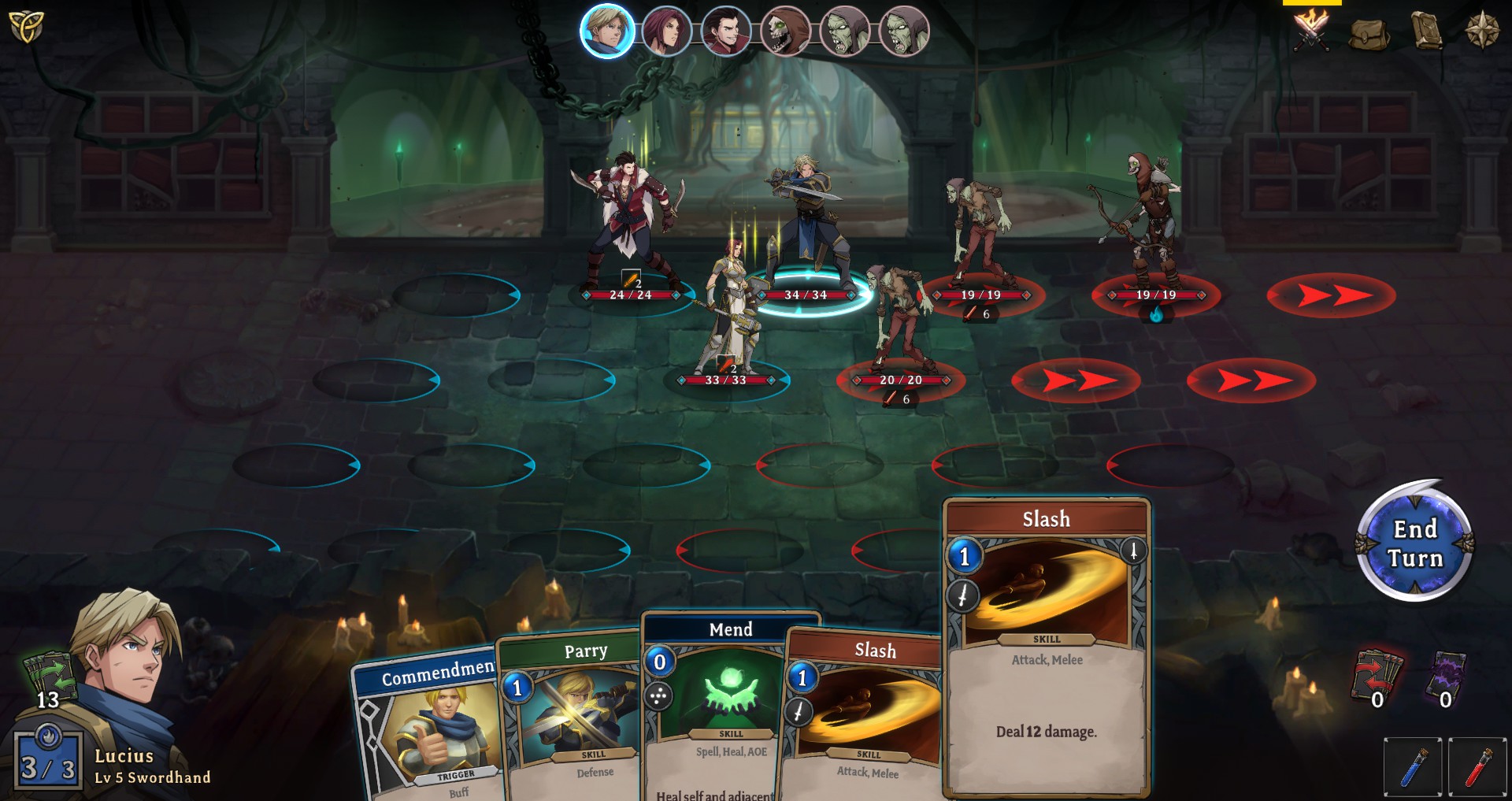
The player’s party consists of three characters that follow standard Dungeons & Dragons archetypes; the fighter, cleric, scoundrel, wizard, druid, ranger and bard. There may be more than seven characters to choose from (I will confess to not having finished Act II yet) but even if there isn’t, there is plenty of depth to each so the choice does not feel limiting. Each character has a deck of skill cards that represent what they can do in combat. At the start their decks are small and fairly simple; straightforward attack and defence cards and a few special abilities. These cards are paid for with action points, a finite resource that replenishes every turn.
All of this will be familiar to veterans of the genre and there isn’t much departure from the norm in the core gameplay. There is an element of strategic positioning to encounters with both heroes and enemies sitting on a battle grid and able to move around from position to position. Placing your heroes correctly on the battlefield is very important as certain attacks can only reach a limited number of positions or might have an area of effect. The position can occasionally be awkward, however, as different abilities have different ranges and areas of effect that are often not made clear on the card.
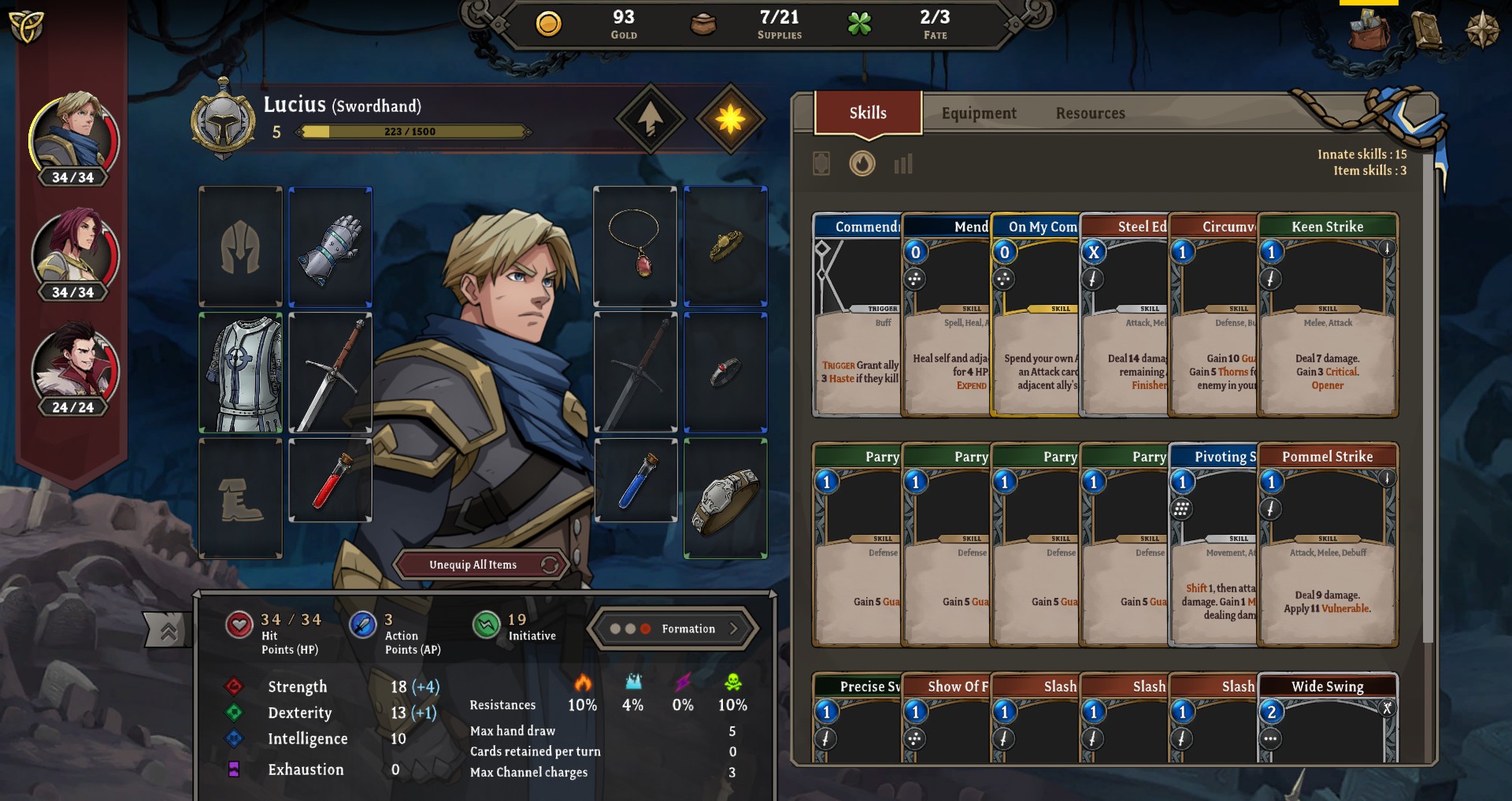
The intent of enemies in encounters can usually be seen, letting you know whether they plan to guard, use a special ability or to attack (and, if so, who is their target). That means Gordian Quest should be a highly strategic game. At the start of each round the player knows the intentions of their enemies and the capabilities of their heroes and the gameplay becomes a puzzle of eking out maximum efficiency from the options available. The reality of the game is a little disappointing in that regard, however. I played on Normal difficulty for Act I and never felt challenged at any point. It was rare that any of my characters even took any damage in an encounter and thus the vast majority of the strategic appeal was lost, leaving me only to take pleasure from keying combos and deck manipulation. I bumped up the difficulty on Act II and found the combat much more intense and engaging. I would certainly recommend that veterans of the genre start on Hard difficulty, rather than Normal.
Once all enemies on the battlefield have been defeated your party will gain experience and loot from the encounter. These are the two main avenues to customizing your characters in Gordian Quest. Experience leads to levelling up which rewards characters with skill points and talent points. Skill points are spent on a grid (a little like Final Fantasy X’s sphere system) where nodes adjacent to other unlocked nodes can be activated. These allow you to add cards to that character’s deck (each character has three disciplines to choose from), remove cards to streamline the deck, gain stat points (each skill is associated to one of three core stats that affect their usefulness) and other abilities. Talent points are a rarer and more diverse pool of abilities. They are also common across all characters with each having access to the same talent choices.
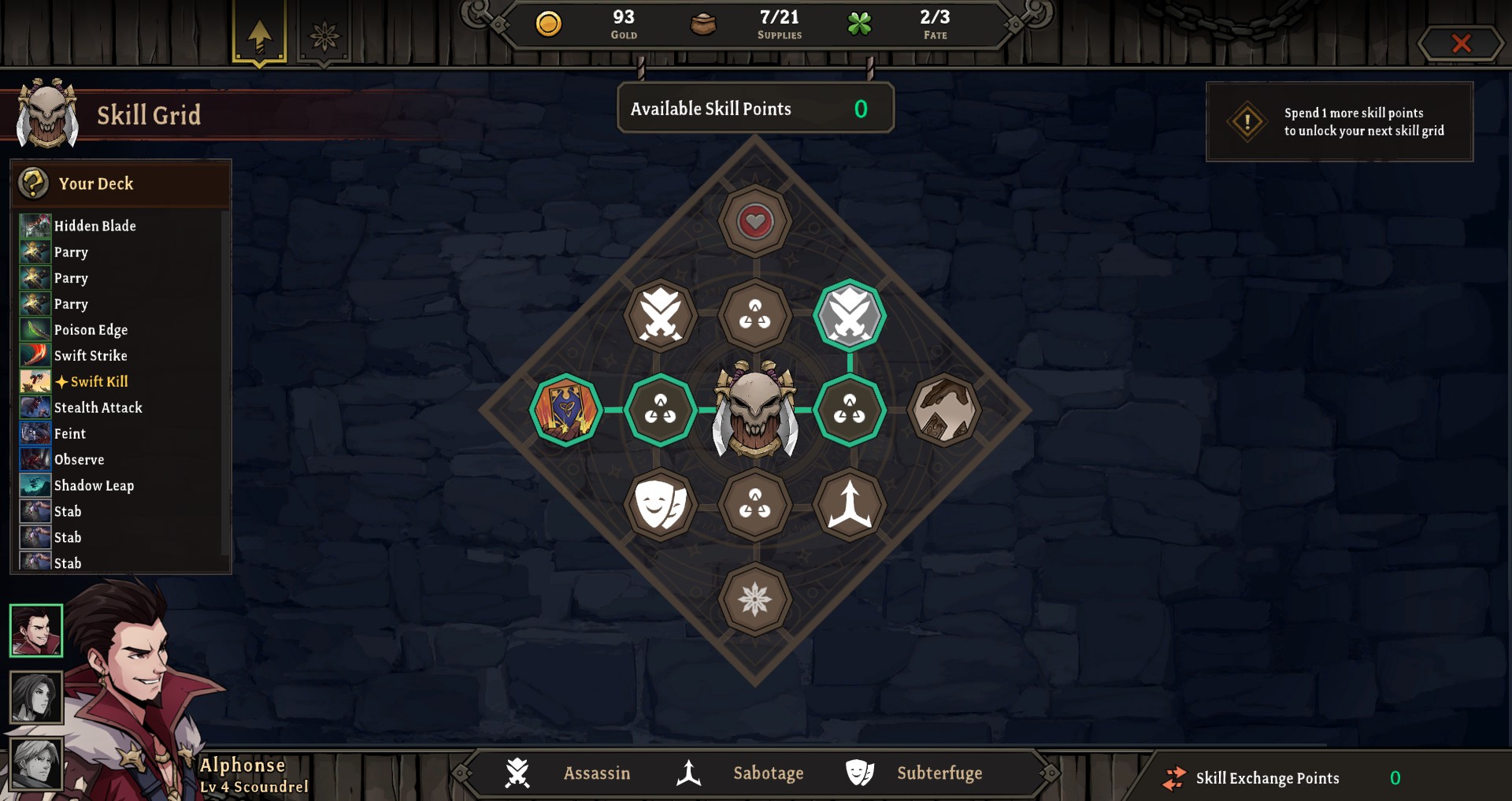
Equipment is the other major way that characters can be made distinct; from each other and from previous iterations you may have played. All of your standards are here. A wide variety of weapons, armour and accessories will ship up over the course of one run, with plenty of different boosts to tweak and hone your character exactly as you want. The character’s talents come into play here though. A large section of them relate to weapon and armour proficiencies that restrict what each character can equip. The fighter can use a wide variety of melee weapons and heavier armours, for example, where the mage is limited to daggers and light armour but gains access to staffs and wands. Talent points can be spent to grant extra proficiencies though, in my playthrough, I was showered with so much equipment that it never felt necessary. Chances are that a little bit of patience would reward me with some throwing knives for my scoundrel and, if not, I could always buy them from the shop in town.
Stat boosts are not the only abilities of equipment though; many come with special cards that will be added into your deck while the equipment is active. These range from the mundane to the absurdly powerful and add a great deal of ability to flex your character one way or another. A lot of equipment also comes with slots to attach runes. These are special stones that add yet more properties to the equipment from basic things such as boosts to the core stats to affecting the properties of the card that equipment adds to your deck.
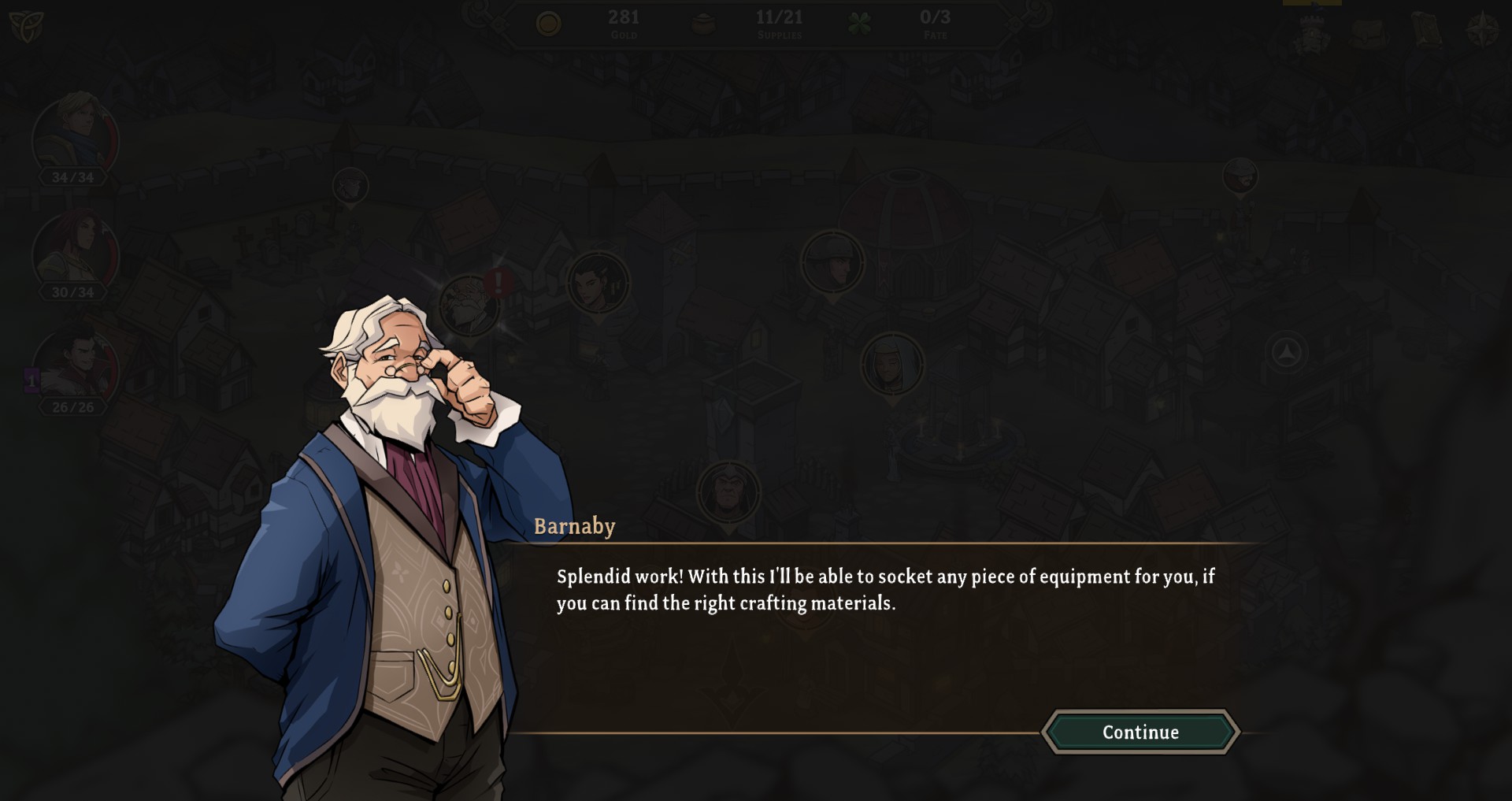
If all of this sounds like a dizzying array of options then know that it certainly can be. The scope for polishing and tweaking your character using skills, talents, equipment and runes is absolutely vast and you won’t be short on the ability to get it exactly how you like as the game throws these things out like confetti. To be clear, that isn’t necessarily a good thing. By about halfway through my run on Act I I stopped paying attention to most of the loot I picked up. My characters were already powerful with legendary equipment aplenty and even the rare item drops held little interest for me. It feels like a system designed to encourage tweaking and experimentation with different options actually just overwhelms the player to the point where it doesn’t seem worth the effort; particularly with my aforementioned problems with difficulty meaning any adjustments would only have been for my own satisfaction.
Gordian Quest’s map exploration system has a few interesting tweaks to offer to liven up gameplay. For most of the game your party will be moving between nodes on the world map; some of which are encounters with enemies but others offer chances to set up camp, shrines that alter encounters on the world map or non-combat encounters. The last of these is the most interesting as each offers a little bit of story and usually one or more choices on what to do. Some of these require your characters to take skill checks. These will be familiar to fans of D&D as the game will roll a d20 and add your character’s relevant stat to try and beat a target number. There is opportunity to influence this though as players can get a bonus if they exhaust a card from their deck.
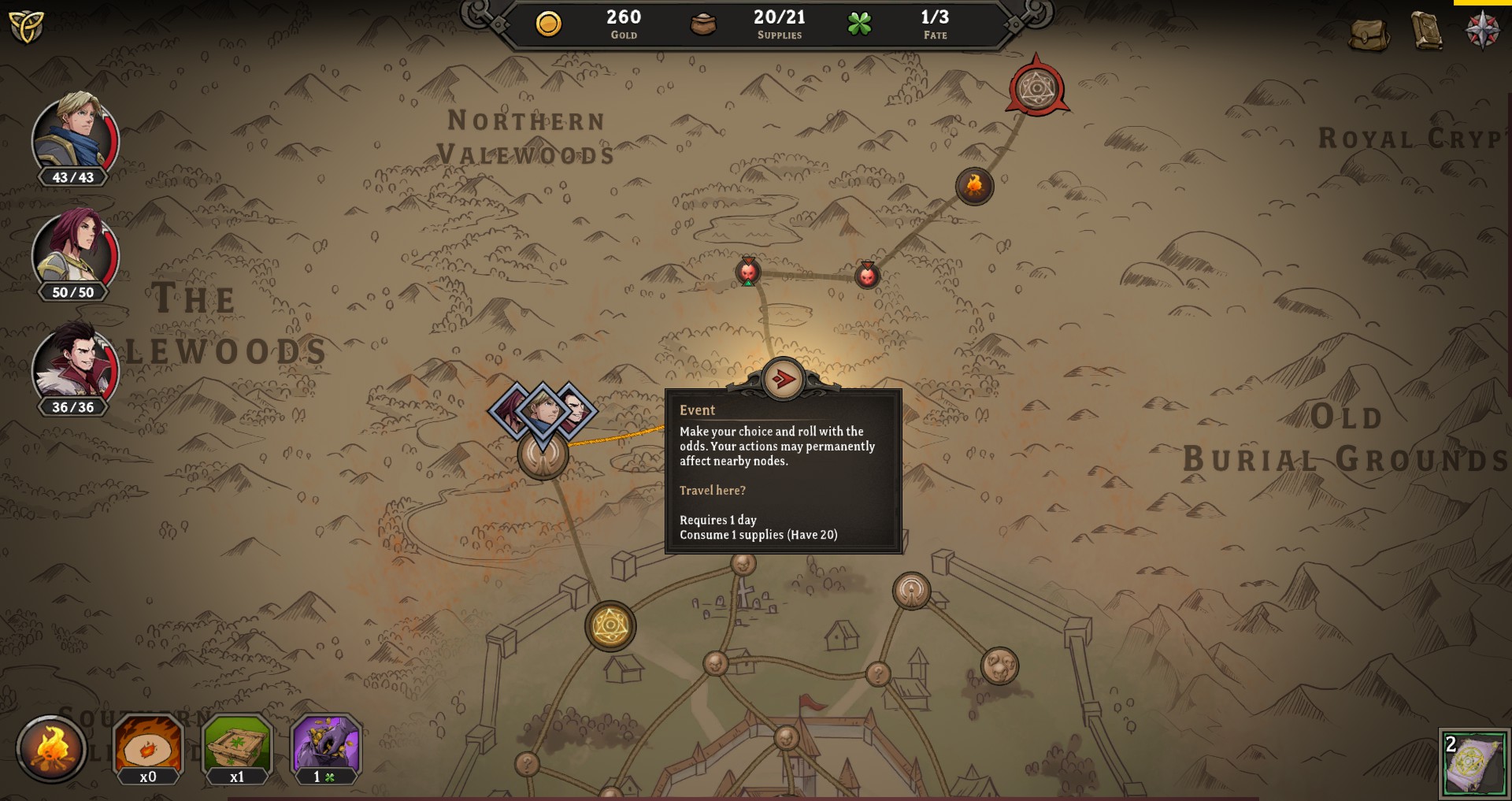
Theoretically this presents an interesting choice (and what is a good game but a series of very interesting choices?). Exhausted skill cards sit in your deck doing nothing. If you draw them in a combat encounter they are useless and they can only be activated again by camping or staying at an inn. In reality I found this exhaustion mechanic to be of little consequence though. Skill checks are rare enough not to massively impact your deck and opportunities to camp and refresh those cards are plentiful.
Probably the most unusual thing about Gordian Quest is how it shirks some of the conventional wisdom of the roguelike genre. At the end of each act you unlock points that can be spent to modify characters at the start of the next game you play; this is the means by which one run impacts the next. However the playtime for a run of Gordian Quest is pretty significant. Where most roguelikes I’ve played through range from an hour to three for a run (or less if you’re a touch on the useless side like I am and keep dying). Gordian Quest’s first act took me over ten hours of gameplay to get through.
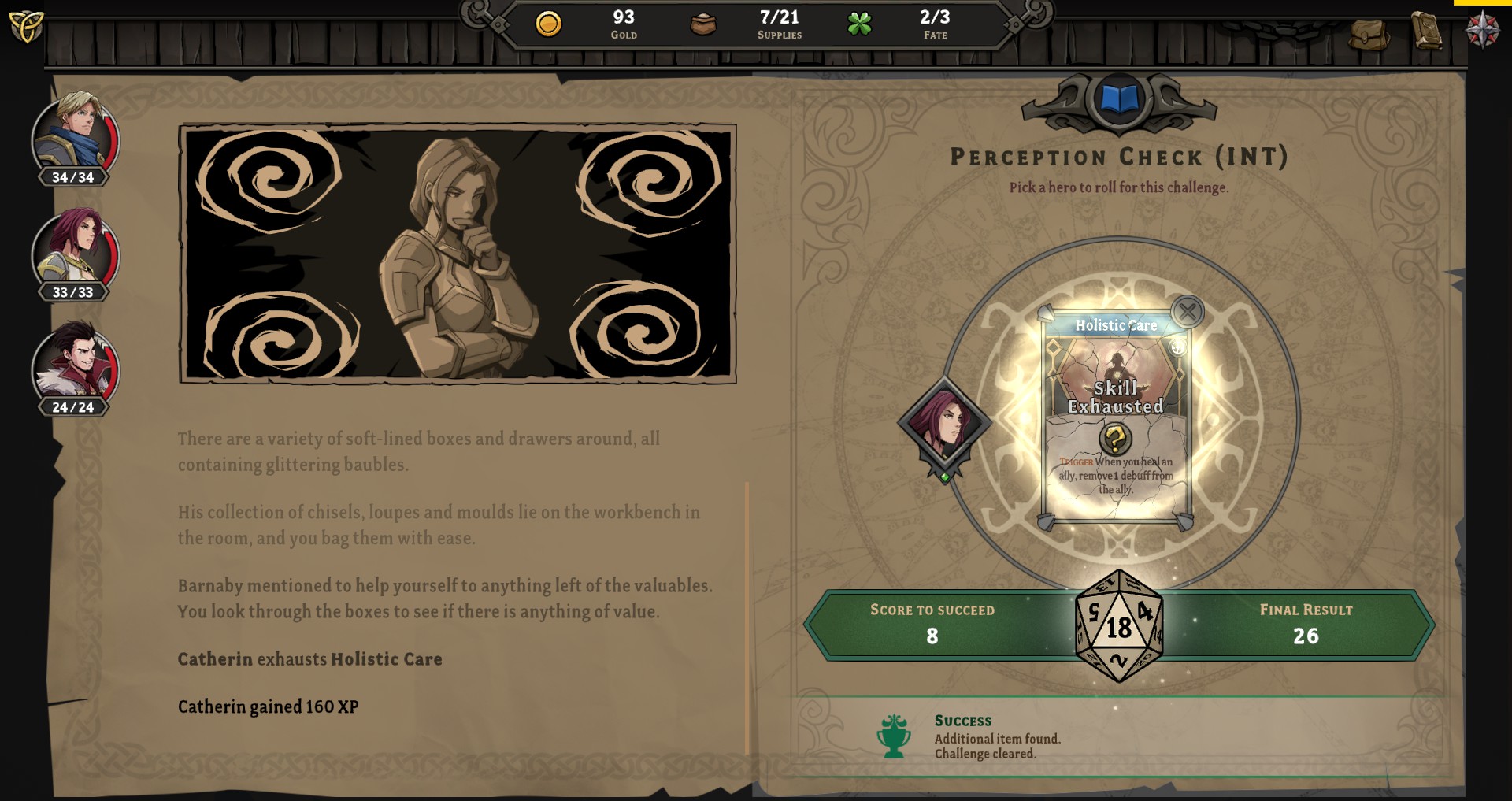
I am actually in two minds what I think of this. I’m sure that when you know the acts it is easy to get that time down (you don’t have to read all the dialogue for a start) but I can’t see it ever really clocking in at less than six or seven. In addition, while you can change the setting to permadeath, the default setting is roguelite; meaning your run is only over if your whole party gets wiped in an encounter. All this makes me think the game is not designed for the usual loop of continuous death and repetition but rather to present a good challenge but one that will be overcome on the majority of runs. Add that into the long run length and you have a curious beast. The gameplay and customization suggests replayability but the time-commitment and story-focussed nature of the act structure seem to lean away from that.
Despite some of the flaws I’ve mentioned, I really enjoyed Gordian Quest and will keep playing it. The deck-building and customization is deep, complex and rewarding and the non-combat gameplay elements contain some interesting ideas. Whilst I have been critical of some difficulty and balance issues with the game, remember that this is still in early access and will no doubt change many times before final release. If and when the developers manage to strike the right balance of challenge in Gordian Quest there could be an absolute cracker of a game here. The key will be seeing whether the game can get to the point where all of those interesting choices are meaningful. At that point it will come down to a question of how much of an appetite there is for a roguelike game with a long run-time and potentially repetitive story elements. I sincerely hope Gordian Quest catches with people though as it feels like there’s a lot to explore here and potentially an extremely satisfying experience that will leave veterans and newcomers alike purring.
EDIT: Since submitting this review I have played through much of Act II and am happy to report that the issues with difficulty I reported in the review only seem to apply to Act I. Act II is a much more challenging and sprawling affair that tests your resources and skills much more than Act I. I still have some slight concerns that Act I is so long and presents little challenge but the good news is that there is a meaty threat waiting once you get through it.
Gordian Quest is available now for PC on GOG and Steam.
Great review! Your writing has a nice flow
looks ok, but honestly im looking for something similar to pillars of eternity, pathfinder:kingmaker, divinity series, tyranny…
those kinds of crpg games 🙁
cant wait for baldur’s gate 3 and the new upcoming games I mentioned